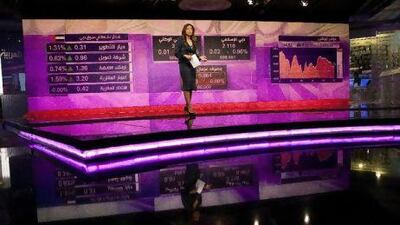Television viewers are notoriously trigger-happy with the remote control.
With more than 500 satellite channels beamed across the Arab world, television stations face an increasingly tough battle for the attention of fickle audiences.
That may be especially true for the two new Arabic-language news stations set to hit the airwaves next year.Observers say the newcomers will have to work doubly hard to be noticed by viewers and advertisers.
"I think it will be extremely difficult to build a commercially viable pan-Arab news station in this day and age," says Mazen Nahawi, the founder and president of News Group International, which is based in Dubai and specialises in media monitoring.
Arguably, the timing could not be worse for the launch of Sky News Arabia, ajoint venture between Sheikh Mansour bin Zayed and BSkyB, and Alarab, which is backed by the Saudi billionaire Prince Al Waleed bin Talal. Sky News Arabia will be based in Abu Dhabi.
Uprisings in North Africa and the Middle East boosted viewer numbers for Arabic news stations earlier this year - but a decline in advertising revenue.
And that means the two new 24-hour news stations have missed out on the surge in interest in countries experiencing the so-called Arab Spring. Yet both face a battle for a slice of the Middle East's diminishing advertising pie.
The cost of a 24-hour TV news operation is high, given the numerous international bureaus required.
"News is usually among the costliest TV programmes to organise and run," says Sami Raffoul, the founder and general manager of the Pan Arab Research Center (Parc).
That means few, if any, Arabic-language news stations can cover costs with advertising revenue alone.
Elie Aoun, the managing director for the Middle East and North Africa region at Ipsos MediaCT, which tracks advertising spending in the region, claims no Arab news stations are commercially viable, including the industry leaders Al Arabiya and Al Jazeera.
"In my opinion, none of the news TV stations are covering their expenses from advertising revenues, even the most successful ones," says Mr Aoun.
Revenue figures are sketchy for stations such as Al Arabiya, Al Jazeera and the business network CNBC Arabiya.
Al Arabiya, which is operated by the MBC Group, based in Dubai, reportedly attracts the biggest share of advertising revenue. Parc says the channel pulled in US$131 million (Dh481.1m) of revenue last year, compared with $83m for Al Jazeera and $29m for CNBC Arabiya.
Yet these figures could be overestimated by as much as 50 per cent because they do not account for discounted or free advertising.
Whatever the true advertising rates, news stations are battling for one of the smallest per-capita advertising markets in the world.
According to the Arab Media Outlook 2009-2013, just $22 per capita was spent on advertising in the Arab region, compared with $462 per capita in North America and $273 in Western Europe. On top of this, Arabic news stations have suffered a fall in advertising revenue this year, says Mr Aoun. "Unless they … take corrective measures to increase the total advertising revenues, the same pie will be distributed among more players," he says. "Price wars and discounts should be restricted."
Parc says ad spending on Al Jazeera stood at just $35m between January and August this year - compared with $83m for all of last year.
One complicating factor for the launch of Sky News Arabia and Alarab is that not all existing Arabic-language news stations are run on purely commercial terms.
The Qatari government props up Al Jazeera with millions of dollars a year. Many smaller Arabic stations are linked to governments or, as in the case of the BBC, receive taxpayers' money. These include the US-funded Al Hurra and BBC Arabic.
Matt Duffy, an assistant professor of journalism at Zayed University in Abu Dhabi, says several Arabic news channels exist for political rather than commercial reasons.
"Sometimes, it isn't about … audience. It's about the owners wanting to make sure that their perspective is out there," he says. "It comes down to not necessarily what the market will bear but how much money the owners are willing to lose."
Mr Nahawi agrees. "People who [have launched Arabic news stations] are the people who fundamentally don't care about profits. The Russians, the Chinese, the French. A lot of this is done for political outreach," he says.
With more than a dozen pan-Arab news stations already on the airwaves, several commentators believe the market is saturated. But others are convinced Sky News Arabia and Alarab could attract viewers if they get the editorial stance just right. "The market for television news is over-saturated," says Mr Nahawi. "But like all things in life, the market for quality news and original journalism is not saturated."
Jamal Khashoggi, a veteran Saudi journalist, has been named the manager of Prince Al Waleed's Alarab channel. He recently wrote on his Twitter feed that the channel would be "on the left of Al Arabiya and the right of Al Jazeera".
It was not clear how Mr Khashoggi defines "left" and "right" in the complex political spectrum of the Arab world. But in any case, a "middle ground" channel is unlikely to work in this region, says Mr Nahawi.
"This isn't a place and a people who like middle ground. We are a people who have decided that we want to take a stand for something," he says.
Whether viewers "take a stand" in support of Sky News Arabia and Alarab remains to be seen. What they decide will dictate how much advertising these stations attract. But politics will also be a factor in whether the stations remain on the air.
bflanagan@thenational.ae

Tough times ahead for hard news
Two additional Arabic news channels are set to hit the Middle East's crowded airwaves next year. But for Sky News Arabia and Alarab to have any chance of commercial success, they will have to stand out from the crowd.
Most popular today
